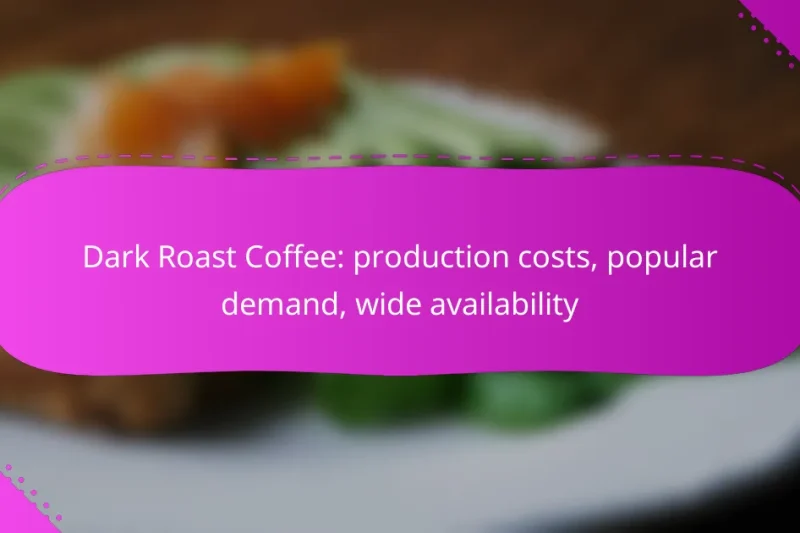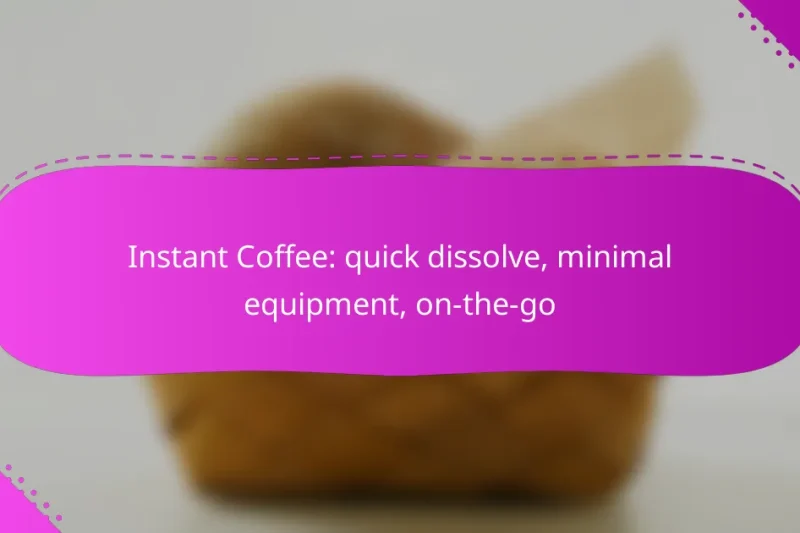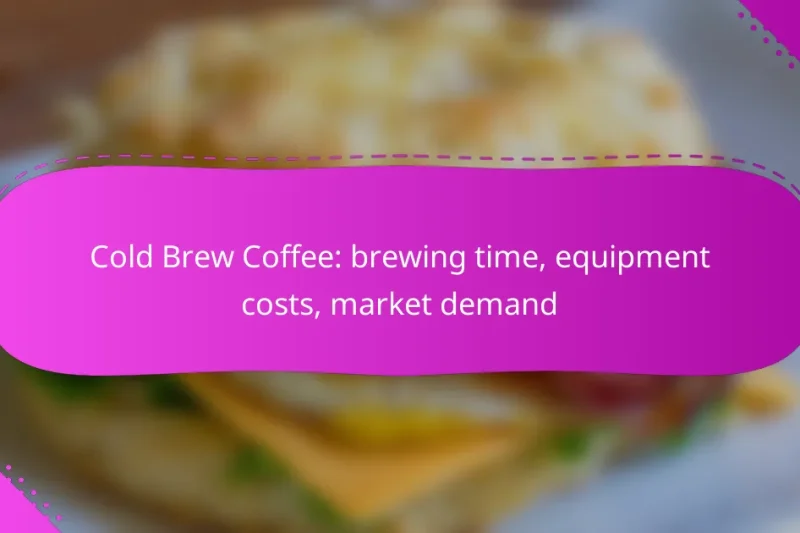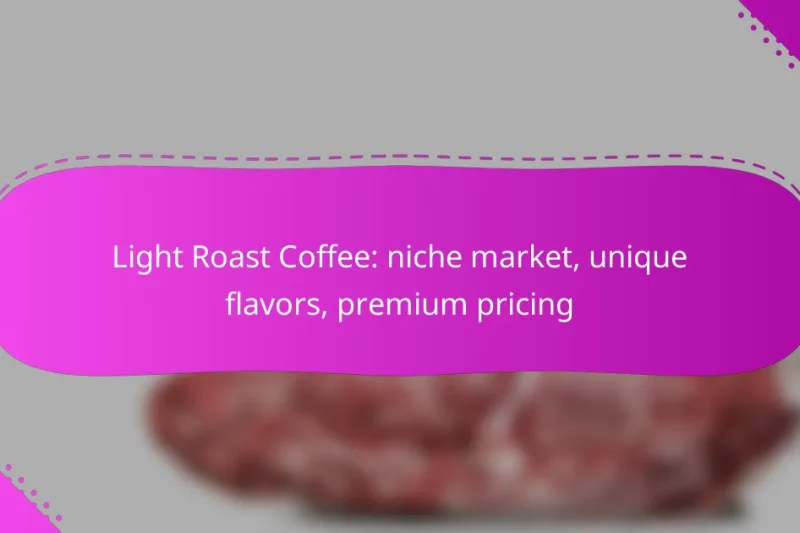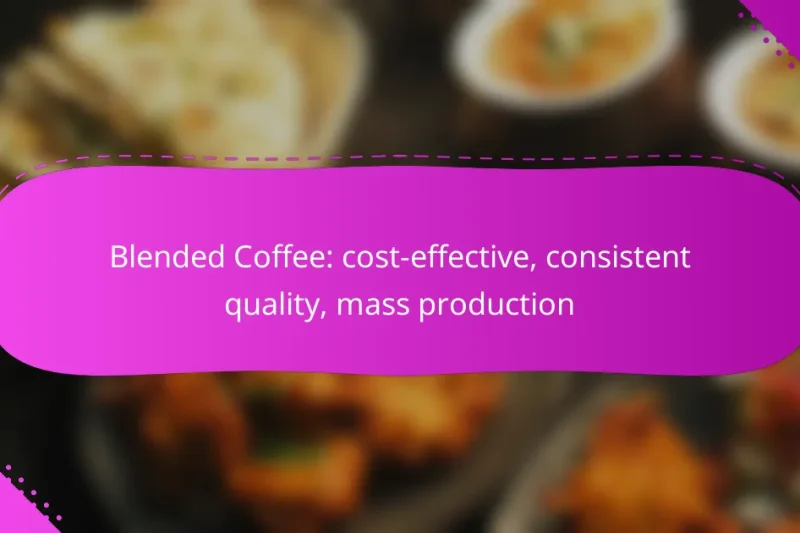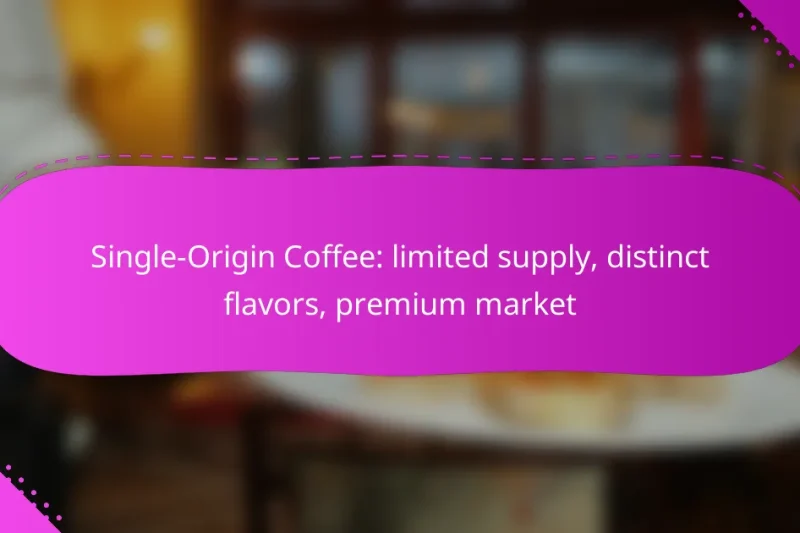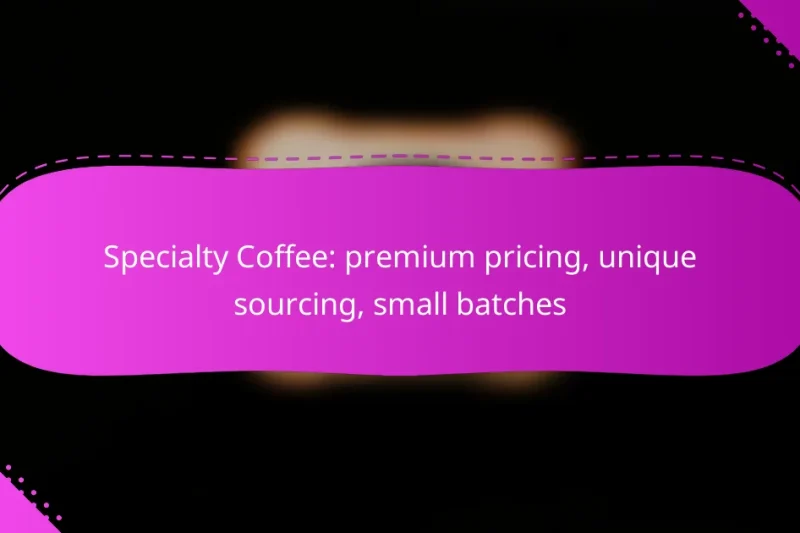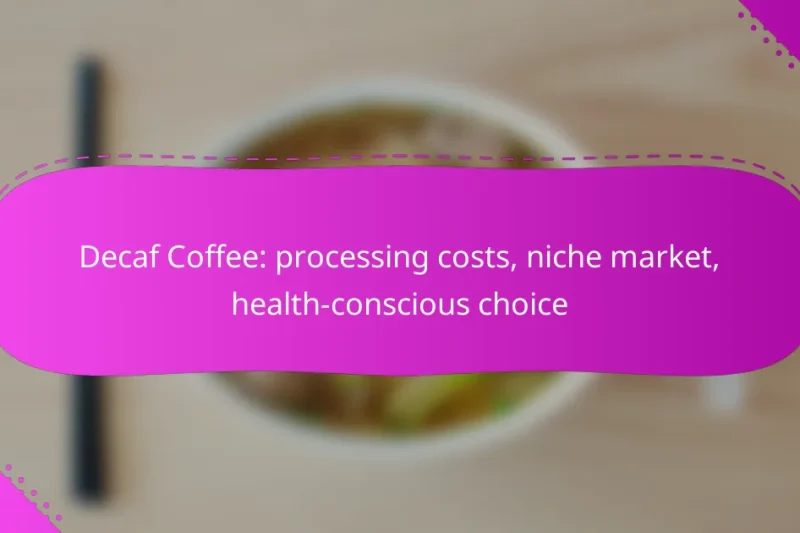Dark roast coffee has become increasingly popular in New Zealand, driven by a consumer preference for … Dark Roast Coffee: production costs, popular demand, wide availabilityRead more
Costs and Logistics of Different Coffee Types
The costs and logistics of different coffee types in New Zealand are influenced by factors such as quality, preparation methods, and shipping requirements. While instant coffee remains the most budget-friendly option, specialty coffee can incur higher expenses due to its unique sourcing and preparation processes. Additionally, understanding the logistics of sourcing both local and international coffee is essential for ensuring efficient access to quality products.
Flavored Coffee: added ingredients, diverse pricing, seasonal trends
Flavored coffee has become a beloved choice for many, offering a delightful range of options from … Flavored Coffee: added ingredients, diverse pricing, seasonal trendsRead more
Instant Coffee: quick dissolve, minimal equipment, on-the-go
Instant coffee is the perfect solution for those seeking a quick and convenient caffeine fix. With … Instant Coffee: quick dissolve, minimal equipment, on-the-goRead more
Cold Brew Coffee: brewing time, equipment costs, market demand
Cold brew coffee has gained popularity for its smooth, less acidic flavor, achieved by steeping coarsely … Cold Brew Coffee: brewing time, equipment costs, market demandRead more
Light Roast Coffee: niche market, unique flavors, premium pricing
Light roast coffee has carved out a niche market, appealing to enthusiasts who appreciate its vibrant … Light Roast Coffee: niche market, unique flavors, premium pricingRead more
Blended Coffee: cost-effective, consistent quality, mass production
Blended coffee is a popular choice for consumers seeking consistent flavor and cost-effectiveness. By combining various … Blended Coffee: cost-effective, consistent quality, mass productionRead more
Single-Origin Coffee: limited supply, distinct flavors, premium market
Single-origin coffee is a premium choice for enthusiasts, celebrated for its distinct flavors and limited supply … Single-Origin Coffee: limited supply, distinct flavors, premium marketRead more
Specialty Coffee: premium pricing, unique sourcing, small batches
Specialty coffee is distinguished by its premium pricing, which reflects the unique sourcing, small batch production, … Specialty Coffee: premium pricing, unique sourcing, small batchesRead more
Iced Coffee: brewed hot, chilled quickly, refreshing drink
Iced coffee is a delightful beverage created by brewing hot coffee and chilling it quickly to … Iced Coffee: brewed hot, chilled quickly, refreshing drinkRead more
Decaf Coffee: processing costs, niche market, health-conscious choice
Decaf coffee has gained traction as a health-conscious choice, appealing to those who wish to enjoy … Decaf Coffee: processing costs, niche market, health-conscious choiceRead more
What are the costs of different coffee types in New Zealand?
The costs of various coffee types in New Zealand can vary significantly based on factors like quality, preparation method, and packaging. Generally, instant coffee is the most affordable option, while specialty coffee can be quite expensive due to its unique sourcing and preparation processes.
Instant coffee pricing
Instant coffee is typically the least expensive type of coffee available in New Zealand. Prices usually range from NZD 5 to NZD 15 for a 100-gram jar, depending on the brand and quality. This makes it a convenient choice for those looking for a quick caffeine fix without breaking the bank.
When purchasing instant coffee, consider the flavor and brand reputation, as some may offer better taste profiles than others. Look for options that dissolve easily and have a rich flavor to enhance your experience.
Ground coffee pricing
Ground coffee prices in New Zealand generally fall between NZD 10 and NZD 30 for a 250-gram bag. The cost can vary based on the origin, roast level, and brand. Popular brands often command higher prices due to their quality and flavor profiles.
When selecting ground coffee, pay attention to the roast date for freshness. Buying in bulk can also save money, but ensure you have proper storage to maintain the coffee’s flavor over time.
Whole bean coffee pricing
Whole bean coffee typically costs between NZD 15 and NZD 40 for a 250-gram bag in New Zealand. This type of coffee is favored for its freshness and flavor, as it allows for grinding just before brewing. Specialty and single-origin beans often fall on the higher end of this price range.
Investing in a good grinder can enhance your coffee experience, as freshly ground beans yield better flavor. Consider trying different beans to find your preferred taste profile.
Specialty coffee pricing
Specialty coffee prices can vary widely, often ranging from NZD 20 to NZD 60 for a 250-gram bag. This category includes unique, high-quality coffees sourced from specific regions, often with distinct flavor notes. The higher cost reflects the meticulous cultivation and processing methods used.
When exploring specialty coffee, look for certifications such as Fair Trade or organic, which can indicate ethical sourcing practices. Joining a coffee subscription service may also provide access to a variety of specialty coffees at a better price.
Single-serve coffee pod pricing
Single-serve coffee pods generally cost between NZD 0.50 and NZD 1.50 per pod in New Zealand. While convenient, the overall cost can add up quickly compared to other coffee types. Many brands offer a variety of flavors and strengths, catering to different preferences.
When using coffee pods, consider investing in a reusable pod to save money and reduce waste. Always check compatibility with your coffee machine to ensure a proper fit and optimal brewing.
How do shipping costs vary for coffee types in New Zealand?
Shipping costs for different coffee types in New Zealand can vary significantly based on the product’s weight, packaging, and supplier. Generally, instant coffee tends to be cheaper to ship than specialty or whole bean coffee due to its lighter weight and compact packaging.
Shipping costs for instant coffee
Instant coffee is typically the most economical option for shipping. Due to its lightweight and compact nature, shipping costs can range from NZD 5 to NZD 15, depending on the quantity ordered. Many suppliers offer flat-rate shipping for instant coffee, making it a budget-friendly choice.
When ordering instant coffee, consider purchasing in bulk to take advantage of lower per-unit shipping costs. Look for local suppliers to reduce shipping fees and delivery times.
Shipping costs for ground coffee
Ground coffee generally incurs moderate shipping costs, often between NZD 10 and NZD 20. The weight of the packaging and the amount ordered can influence the final shipping price. Ground coffee is usually heavier than instant coffee, which can lead to higher shipping fees.
To minimize costs, consider ordering larger quantities or combining orders with friends. Always check for shipping promotions or discounts offered by suppliers.
Shipping costs for whole bean coffee
Shipping costs for whole bean coffee can be higher, typically ranging from NZD 15 to NZD 30. The weight of whole beans and their packaging contributes to increased shipping expenses. Additionally, some specialty brands may charge more for shipping due to their premium products.
To save on shipping, look for local roasters that offer free or reduced shipping rates. Joining a coffee subscription service can also provide cost-effective shipping options.
Shipping costs for specialty coffee
Specialty coffee often has the highest shipping costs, usually between NZD 20 and NZD 40. This is due to the unique packaging, weight, and sometimes fragile nature of the product. Specialty coffee often comes from specific regions, which can add to shipping complexity and costs.
When purchasing specialty coffee, consider ordering directly from the roaster to potentially reduce shipping fees. Keep an eye out for promotions or free shipping offers, especially during seasonal sales.
What are the logistics of sourcing coffee in New Zealand?
Sourcing coffee in New Zealand involves both local and international options, each with its own logistical considerations. Understanding these logistics is crucial for businesses and consumers looking to obtain quality coffee efficiently.
Local sourcing options
New Zealand has a growing number of local coffee roasters and producers, particularly in regions like Auckland and Wellington. Sourcing locally can reduce transportation costs and support the local economy, but the variety of beans may be limited compared to international sources.
When considering local options, look for specialty coffee shops that partner with local roasters. This can provide fresher coffee and unique blends that reflect the local palate.
Importing coffee beans
Importing coffee beans into New Zealand typically involves sourcing from major coffee-producing countries such as Brazil, Colombia, and Vietnam. Import regulations require compliance with food safety standards, and businesses must ensure they have the necessary permits for importing goods.
Costs associated with importing can vary widely based on shipping methods and the origin of the beans. It’s advisable to work with established importers who understand the logistics and can navigate customs efficiently.
Supply chain considerations
Managing the supply chain for coffee involves several key factors, including transportation, storage, and distribution. Businesses should consider the impact of shipping times on freshness and the potential for delays at customs.
Establishing strong relationships with suppliers and distributors can streamline the process. Additionally, using technology for inventory management can help track stock levels and predict demand, ensuring a consistent supply of coffee.
How do coffee types compare in terms of cost-effectiveness?
Cost-effectiveness in coffee types varies significantly based on preparation methods, quality, and packaging. Generally, instant coffee tends to be the most affordable, while specialty coffee often comes with a higher price tag due to its quality and sourcing practices.
Cost-effectiveness of instant coffee
Instant coffee is typically the most budget-friendly option, costing around $5 to $10 per pound. Its long shelf life and ease of preparation make it a practical choice for those seeking convenience without breaking the bank.
However, the trade-off is often in flavor and quality. Instant coffee lacks the richness and depth of freshly brewed options, which may be a consideration for coffee enthusiasts.
Cost-effectiveness of ground coffee
Ground coffee usually ranges from $8 to $15 per pound, offering a balance between cost and quality. This type provides better flavor than instant coffee and is widely available in various blends and roasts.
When purchasing ground coffee, consider buying in bulk or choosing store brands to maximize savings. Keep an eye out for sales or promotions to further enhance cost-effectiveness.
Cost-effectiveness of whole bean coffee
Whole bean coffee generally costs between $10 and $20 per pound. While it may be pricier than ground coffee, it offers superior freshness and flavor, especially when ground just before brewing.
Investing in a quality grinder can enhance the overall coffee experience. Look for sales or local roasters that may offer discounts on bulk purchases to improve cost-effectiveness.
Cost-effectiveness of specialty coffee
Specialty coffee can range from $15 to $30 per pound or more, reflecting its high-quality sourcing and unique flavors. This type is often sought after by coffee aficionados willing to pay a premium for exceptional taste and ethical sourcing.
While it may not be the most cost-effective option for everyday consumption, consider it for special occasions or as a treat. Joining a coffee subscription service can also provide access to specialty beans at a better value over time.
What factors influence coffee pricing in New Zealand?
Several key factors influence coffee pricing in New Zealand, including market demand, production costs, and import tariffs. Understanding these elements can help consumers and businesses navigate the coffee market more effectively.
Market demand
Market demand plays a significant role in determining coffee prices in New Zealand. When consumer interest in specialty or sustainably sourced coffee increases, prices tend to rise due to heightened competition among suppliers.
Seasonal trends, such as increased consumption during winter months or holidays, can also impact demand. This fluctuation often leads to price variations, making it essential for buyers to stay informed about market trends.
Production costs
Production costs encompass various expenses, including labor, equipment, and raw materials. In New Zealand, the cost of labor can be relatively high, which may contribute to increased coffee prices.
Additionally, factors such as climate conditions and agricultural practices can affect yield and quality, further influencing overall production costs. Buyers should consider these aspects when evaluating coffee prices.
Import tariffs
Import tariffs on coffee can significantly impact pricing in New Zealand. Tariffs are taxes imposed on imported goods, and higher tariffs can lead to increased costs for consumers.
New Zealand has relatively low tariffs on coffee, but changes in trade agreements or policies could alter this landscape. Staying updated on trade regulations can help consumers anticipate potential price changes in the coffee market.
